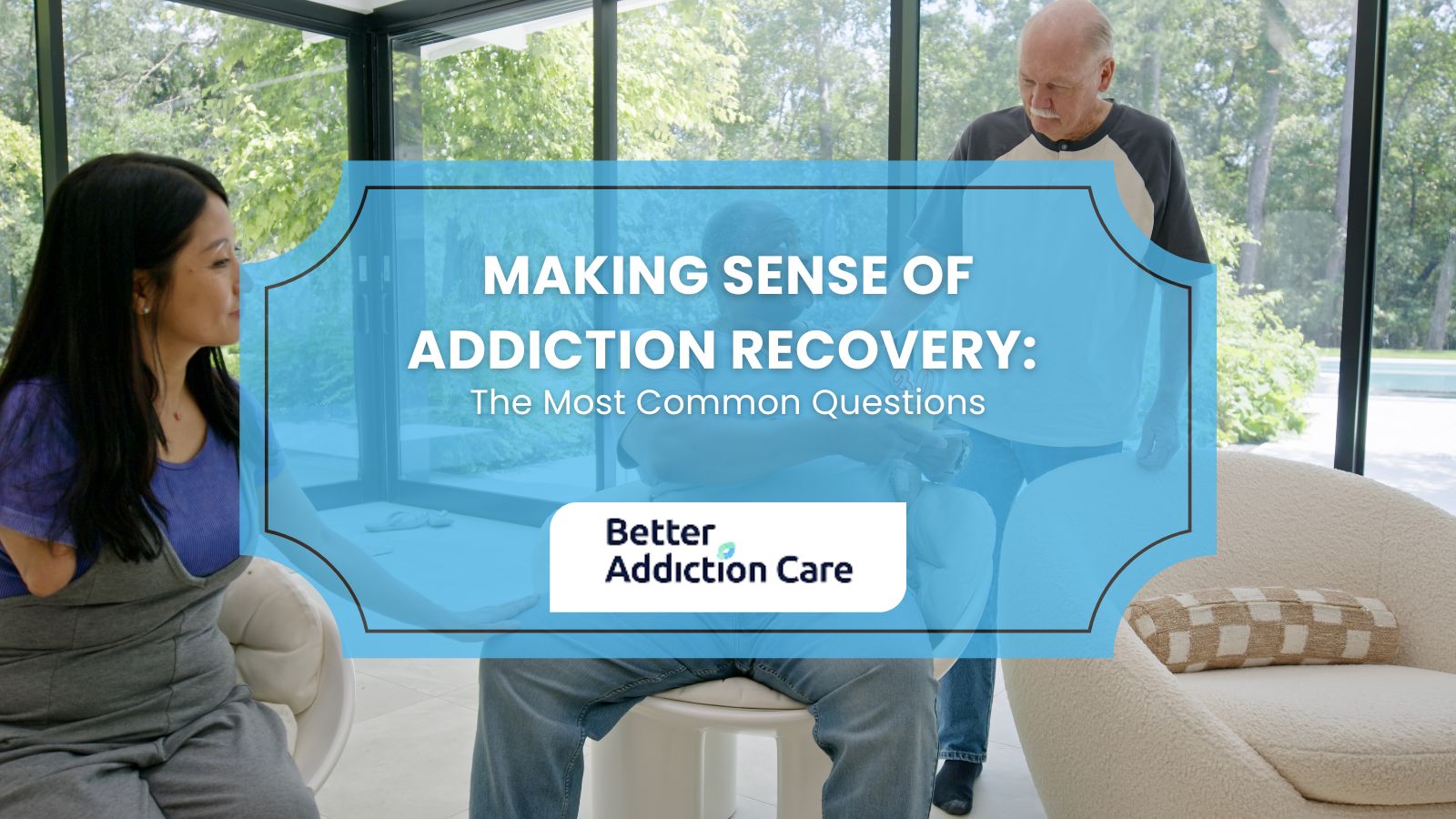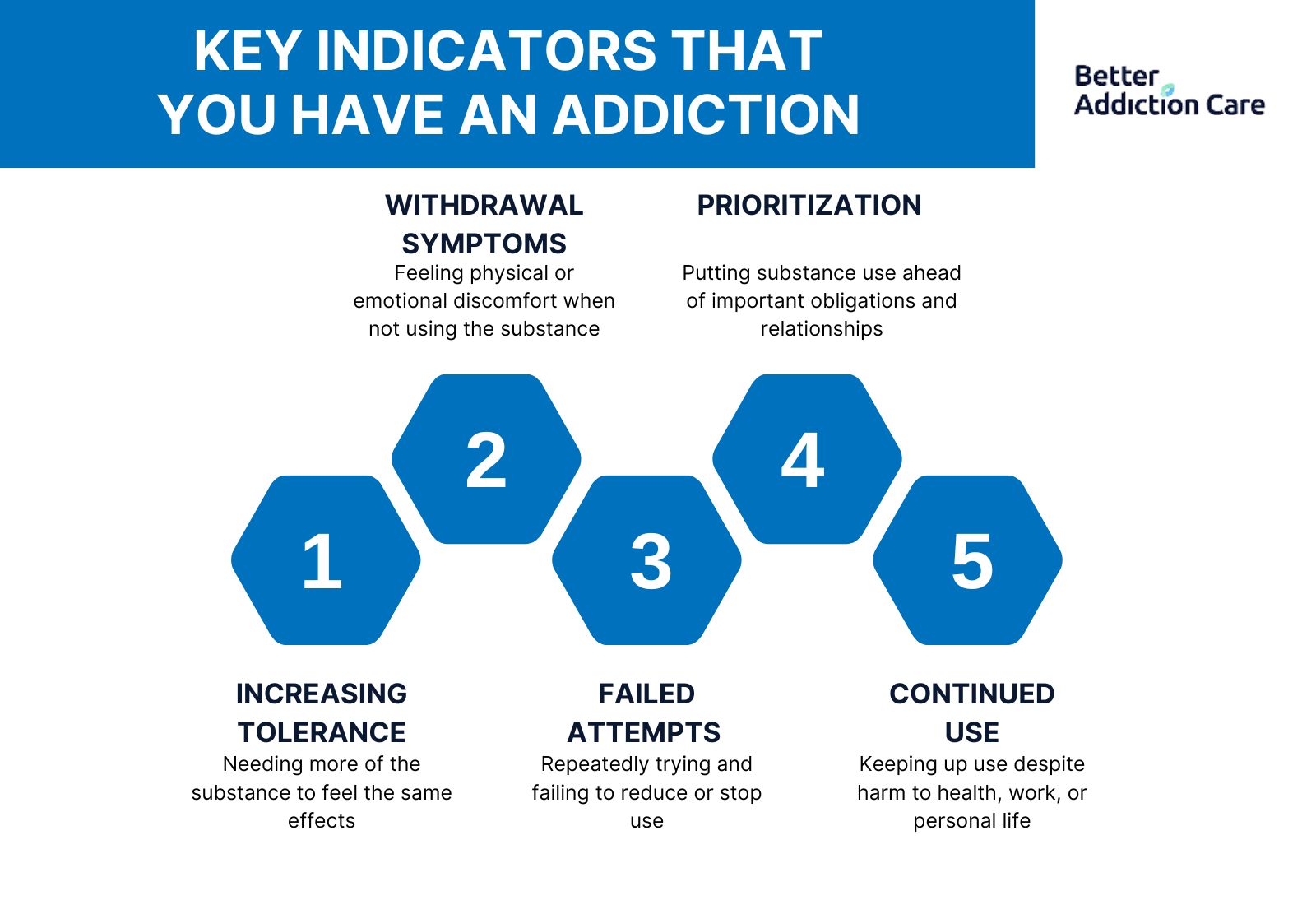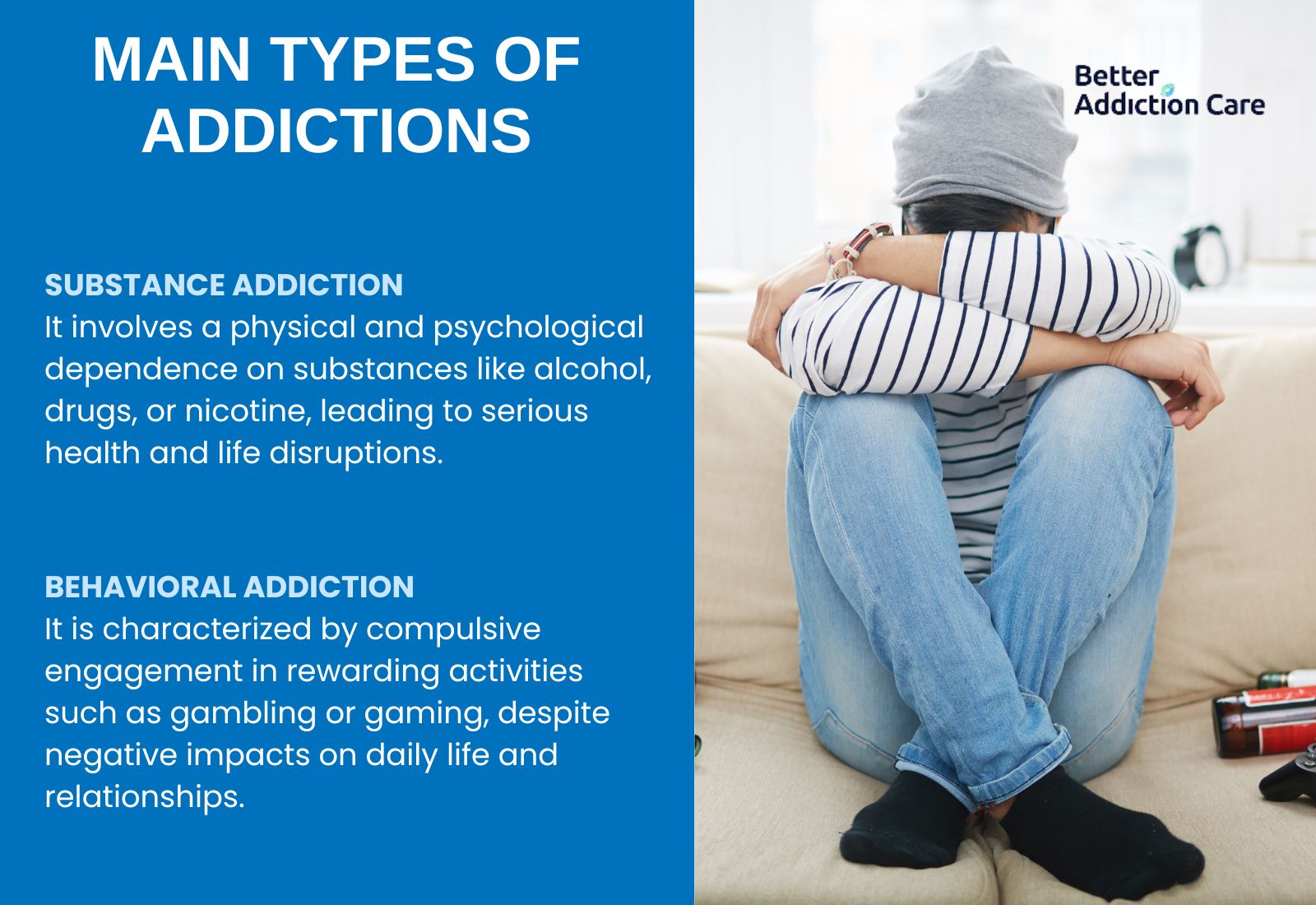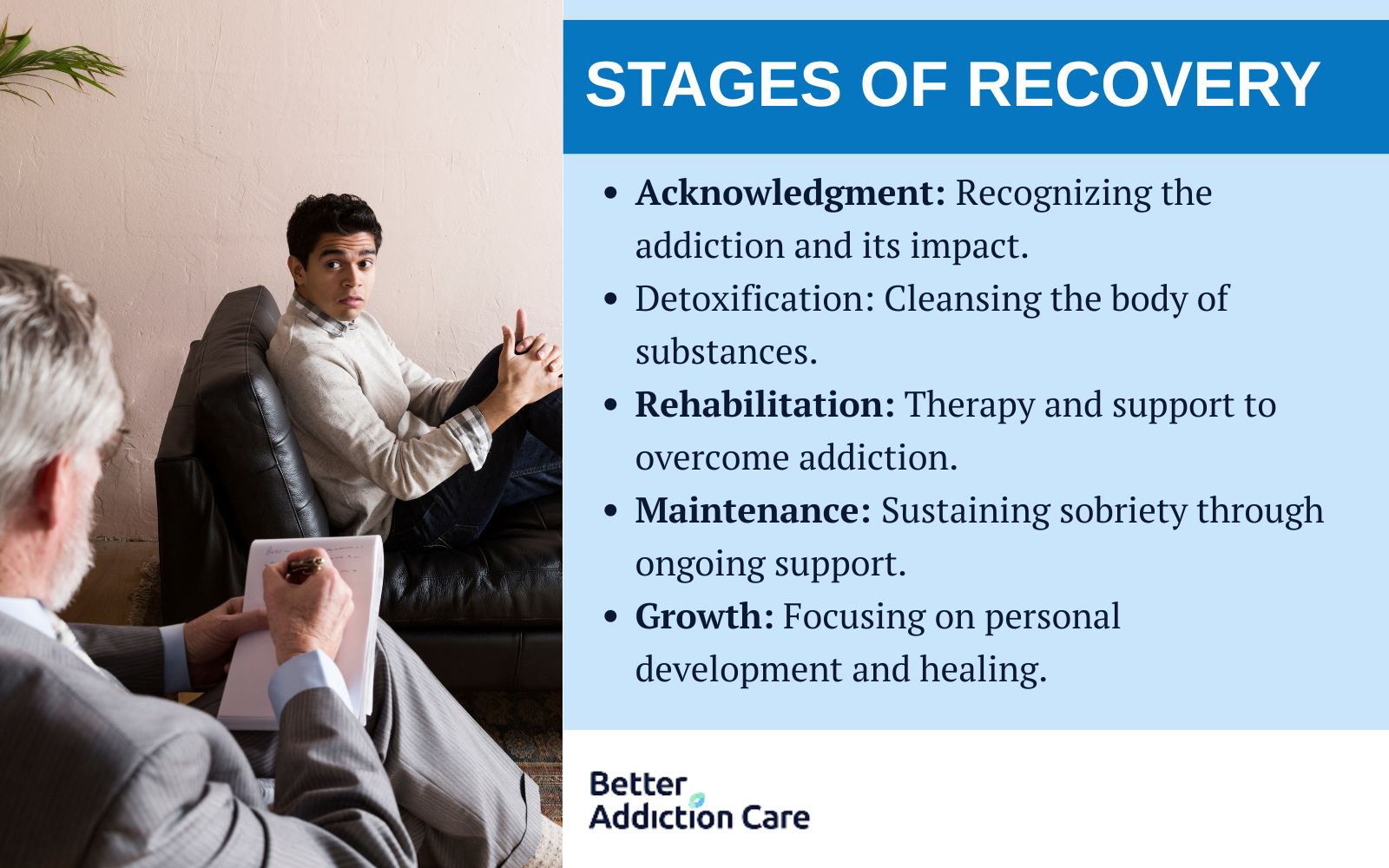Making Sense of Addiction Recovery: The Most Common Questions and Their Answers
Addiction recovery is a personal journey with challenges and growth. Common questions regarding addiction recovery focus on recognizing addiction, the recovery stages, and how long recovery takes. It involves acknowledging the problem, detoxifying, rehabilitation, and maintaining sobriety.

There are different types of addictions, including substance and behavioral. Therapy and support groups play key roles in coping with triggers and preventing relapse, helping individuals rebuild relationships and achieve personal fulfillment.
According to Vanderplasschen, W.’s 2021 study, ‘Mechanisms and mediators of addiction recovery, ’ over 50% of all persons with an alcohol or drug problem eventually recover. A national probability-based estimate in the US indicated that around 9% of all adults have resolved an alcohol or drug problem.
Among those in recovery, 54% used some type of support while only 27.6% utilized professionally assisted recovery support (formal treatment). Recovery is possible and not uncommon, even after lengthy addiction careers.
What Is Addiction, and Why Is Recovery Necessary?
Addiction is a chronic, relapsing brain disorder characterized by compulsive drug seeking and use or engagement in behaviors despite harmful consequences. It develops through a complex interplay of genetic, environmental, and developmental factors that alter brain structure and function, particularly in regions responsible for reward, motivation, learning, judgment, and memory. Over time, the affected individual loses control over their ability to make healthy choices, prioritizing the addictive substance or behavior over other aspects of life, even as negative consequences accumulate in their health, relationships, work, and overall well-being.
According to Sussman, S.’s 2011 study, ‘Prevalence of the Addictions: A Problem of the Majority or the Minority?’, addiction prevalence among U.S. adults ranges from 15% to 61% over a 12-month period, with 47% considered the most plausible estimate for those showing signs of an addictive disorder. This comprehensive analysis examined 11 different addictions (tobacco, alcohol, illicit drugs, eating, gambling, Internet, love, sex, exercise, work, and shopping) using data compiled from 83 studies, each with at least 500 participants.
Recovery is necessary because addiction progressively deteriorates physical and mental health while systematically destroying personal relationships, career prospects, and financial stability if left untreated. The brain changes caused by addiction impair judgment and self-control, creating a destructive cycle that the individual typically cannot break without professional help and support. Recovery provides the opportunity to heal physically and psychologically, rebuild damaged relationships, develop healthy coping mechanisms, and restore normal brain function that was disrupted by substance use or compulsive behaviors.
Additionally, recovery is essential because addiction often coexists with other mental health conditions that require simultaneous treatment, and without addressing the addiction, individuals remain at high risk for serious consequences, including overdose, legal problems, and premature death.
How Do I Know If I Have an Addiction?
To know if you have addiction, look out for signs like needing increased amounts to feel effects, experiencing physical discomfort when stopping use, unsuccessful efforts to cut back, placing substance use above important obligations, and persisting despite harmful outcomes.
Here are the key indicators that you have an addiction:
- Increasing Tolerance: Requiring more of the substance to achieve the same effects.
- Withdrawal Symptoms: Experiencing withdrawal symptoms when stopping the substance use.
- Failed Attempts: Having failed attempts to cut down or control substance use.
- Prioritization: Prioritizing substance use over responsibilities, relationships, and activities once enjoyed.
- Continued Use: Continuing use despite negative consequences to health, work, or relationships.
What Are The Main Types Of Addictions?
The main types of addictions include substance abuse addictions involving alcohol, illicit drugs, and nicotine, as well as behavioral addictions such as gambling, shopping, and gaming disorders. These compulsive patterns significantly impact physical health, relationships, and overall quality of life.Here are the different types of addiction in detail:
Substance Abuse Addictions
Substance Abuse Addictions refer to a compulsive pattern of using certain substances despite negative consequences, leading to dependence and difficulty in stopping or controlling use. Alcohol addiction is one of the most common substance addictions in the United States.
According to the National Institute on Alcohol Abuse and Alcoholism (NIAAA), in the 2024 report, 28.9 million people ages 12 and older (10.2% of this age group) had AUD in the past year.
The most common substance abuse addictions are:
- Alcohol Addiction: Alcohol addiction involves the compulsive and excessive consumption of alcohol, leading to negative consequences in physical health, emotional well-being, or social relationships. It disrupts daily life and reflects a loss of control over drinking habits. Individuals often struggle to overcome this condition without support or intervention, highlighting the importance of understanding and addressing alcohol addiction.
- Illicit Drug Addiction: Illicit drug addiction is the persistent and harmful use of illegal substances or the misuse of prescription medications, leading to negative changes in behavior, health, and overall functioning. This condition traps individuals in a destructive cycle of dependency and often escalates to severe outcomes such as overdose. Understanding the risks and impact of illicit drug addiction is crucial for addressing this growing issue.
- Nicotine Dependency: Nicotine dependency is the physiological and psychological reliance on nicotine, a highly addictive substance found in tobacco products like cigarettes, cigars, and smokeless tobacco. This dependency makes it challenging for individuals to function without regular nicotine intake, even when faced with its adverse health effects.
Behavioral Addictions
Behavioral addictions are compulsive patterns of behavior driven by psychological rewards, leading to negative consequences in personal, social, and professional aspects of life. These addictions often result in a loss of control over the behavior and persist despite harmful outcomes.
Behavioral and substance addictions frequently occur together in the same individuals, creating significant treatment challenges. According to Grant, J. E.’s 2010 study, ‘Introduction to Behavioral Addictions’, compulsive sexual behavior has the highest rate of comorbid substance use disorders at 64%. Pathological gambling follows with rates between 35% and 63%. Internet addiction and pathological skin picking both demonstrate 38% comorbidity with substance use disorders.
Here are the most common behavioral addictions:
- Gambling Addiction: Gambling Addiction involves a compulsive and uncontrollable urge to gamble, leading to negative consequences in finances, relationships, and personal well-being.
- Sex Addiction: Sex Addiction centers on an obsessive focus on sexual thoughts or behaviors that disrupt relationships, work productivity, and daily life.
- Shopping Addiction: Shopping Addiction reflects uncontrolled spending habits resulting in financial difficulties, mounting debt, and emotional distress.
- Eating Disorders: Eating Disorders encompass an unhealthy relationship with food, marked by restrictive, compulsive, or binge eating patterns that harm physical and mental health.
- Work Addiction: Work Addiction arises from an obsessive focus on work-related tasks that overrides relationships, health, and overall well-being.
- Exercise Addiction: Exercise Addiction manifests as excessive and compulsive exercise driven by body image issues or perfectionism, interfering with daily life.
- Love and Relationship Addiction: Love and Relationship Addiction stems from dependence on romantic connections or emotional bonds to alleviate feelings of unhappiness or emptiness.
- Social Media Addiction: Social Media Addiction signifies compulsive use of platforms for validation or escapism, negatively impacting mental health and relationships.
- Gaming Addiction: Gaming Addiction consists of excessive video gaming that disrupts daily responsibilities and personal well-being.
- Smartphone Addiction: Smartphone Addiction refers to over-reliance on devices for entertainment, communication, or information, impairing daily functioning.
What Are the Stages of Recovery?
 The stages of recovery are acknowledgment of addiction's impact, detoxification process, rehabilitation through therapy, maintenance of sobriety, and personal growth beyond addiction.
The stages of recovery are acknowledgment of addiction's impact, detoxification process, rehabilitation through therapy, maintenance of sobriety, and personal growth beyond addiction.
Here are the stages of recovery in detail:
- Acknowledgment: Realizing that one has an addiction and that it is affecting one's life is the first step toward acknowledgment.
- Detoxification: In the case of substance abuse disorder, it is important to start a detoxification program.
- Rehabilitation: Therapy, counseling, and support groups are all part of rehabilitation, which aims to help people overcome their problems and get back on their feet.
- Maintenance: Keeping sober with the help of continuing support, making changes to one's lifestyle, and implementing techniques to avoid relapse.
- Growth: Personal development, mending broken relationships, and discovering one's life's true calling are all aspects of growth.
Can I Recover from Addiction on My Own?
Yes, you can recover from addiction on your own, but professional help leads to better outcomes. Some people succeed through self-help programs alone. Recovery options include therapy, support groups, medication, and holistic approaches. Research shows that seeking help from trained addiction specialists significantly increases recovery success rates and reduces the likelihood of relapse compared to attempting recovery alone.
What Role Does Therapy Play in Recovery?
Therapy plays a crucial role in addiction recovery by providing a safe, supportive environment where individuals explore underlying issues, develop healthy coping skills, and establish positive patterns. Multiple therapeutic approaches are effective in treating addiction, each with distinct advantages and applications. These include cognitive-behavioral therapy (CBT), motivational interviewing, and mindfulness-based techniques, among others.
According to McHugh, R.K.’s 2010 study, ‘Cognitive-Behavioral Therapy for Substance Use Disorders’, CBT shows moderate effectiveness for substance use disorders with an effect size of 0.45 across 34 trials with 2,340 patients. Results are strongest for cannabis treatment, followed by cocaine and opioids, with the weakest results for poly-substance use (0.24).Contingency management approaches produced better outcomes than other CBT variants. Long-term effectiveness was confirmed, with 60% of cocaine-dependent patients in CBT treatment maintaining clean toxicology screens at 52-week follow-up.
How Long Does Recovery Take?
Recovery takes different amounts of time for each person, typically ranging from months to years. The intensity of the addiction, the individual's unique circumstances, and the effectiveness of treatment all influence this timeline. Recovery requires dedication, patience, and persistence throughout the process. While some individuals achieve stability within months, others need years of ongoing support. Recovery should be viewed as a continuous journey with milestones to celebrate rather than a process with a definitive endpoint.
What Are Substance Abuse Triggers?
Substance abuse triggers are specific situations, emotions, or environments that lead an individual to crave drugs or alcohol. Common substance abuse triggers include stressful situations, emotional triggers like anger, anxiety, boredom, physical pain, isolation, etc.
Understanding these substance abuse triggers is crucial for developing effective coping strategies and preventing relapse.
Here are some common substance abuse triggers:
- High-Risk Environments: Places or situations where substance use is prevalent or where one has previously used substances.
- Stressful Situations: Events or circumstances that cause significant stress, leading to cravings for substances as a coping mechanism.
- Emotional Triggers: Feelings such as sadness, anger, loneliness, or anxiety provoke cravings for substances.
- Social Pressures: Interactions with friends or acquaintances who use substances increase the risk of relapse.
- Boredom: A lack of engaging activities or purpose leads to seeking substances for stimulation.
- Routine Changes: Significant life changes, such as moving, changing jobs, or ending relationships, trigger cravings.
- Celebratory Events: Parties or gatherings where substances are present pose a temptation.
- Isolation: Feeling disconnected from loved ones or support networks increases cravings.
- Negative Self-Talk: Engaging in self-destructive thoughts weakens resolve and leads to substance use.
- Physical Pain: Experiencing chronic pain or discomfort prompts some individuals to seek substances for relief.
How To Manage The Substance Abuse Triggers?
To manage substance abuse triggers, identify personal triggers, and create a relapse prevention plan tailored to address them. Avoid high-risk environments where substance use is common and remove substances from your home. Develop healthy coping strategies for stress and emotional challenges through activities like exercise or therapy. Build a strong support network to combat feelings of isolation and replace negative self-talk with positive affirmations. For physical pain or significant life changes, work with healthcare providers to find alternative solutions that do not involve substance use.
What Is Relapse, and How Can I Prevent It?
Relapse is the return to substance use after a period of sobriety. It does not mean recovery has ended, but highlights areas for growth. To prevent relapse, identify triggers and develop strategies to manage them. Build a strong support system, engage in healthy lifestyle choices, and participate in aftercare programs. Cognitive-behavioral techniques and therapy enhance coping skills. If relapse happens, view it as a chance to learn and reinforce commitment to recovery.
What Are The Benefits of Support Groups?
The benefits of support groups include emotional connection with peers who share similar experiences, access to diverse recovery insights, creating a judgment-free environment for authentic expression, and opportunities to engage in sobriety-focused relationships.
How Can I Rebuild My Life After Addiction?
Rebuild your life after addiction by embracing a transformative journey that begins with personal healing. Create meaning and fulfillment by reconnecting with family and friends, pursuing hobbies and interests that bring joy, setting meaningful goals, and taking consistent steps toward achieving them. Recovery provides a fresh start that enables healthier relationships, new career opportunities, and positive contributions to your community, allowing you to construct a more purposeful and satisfying life beyond addiction.
How Do I Find AA and NA Meetings In My Location?
To find AA and NA meetings in your location, start by using online resources specifically designed to connect individuals with local support groups. Many platforms allow you to search by city, state, or ZIP code to locate nearby meetings. Also, visit the official websites of Alcoholics Anonymous (AA) and Narcotics Anonymous (NA), which provide meeting locators to help you find options that fit your schedule and preferences.
At Better Addiction Care, we understand the importance of accessible recovery resources. Our platform makes it easy to find AA and NA meetings tailored to your needs. In addition to meeting directories, we offer personalized support to guide you through your recovery journey. Whether you’re looking for in-person meetings, virtual sessions, or specific types of support groups, Better Addiction Care is here to help you take the next step toward lasting sobriety.
What Are My Options for Local Drug and Alcohol Rehab Near Me?
Your options for local drug and alcohol rehab include inpatient and outpatient facilities, each offering different levels of care and treatment approaches. Inpatient rehab provides residential treatment with 24/7 supervision, structured environments, and intensive therapy programs lasting from 28 days to several months. These facilities are ideal for severe addiction cases requiring detoxification and removal from triggering environments.
Outpatient programs offer more flexibility, allowing you to maintain daily responsibilities while receiving treatment. These include Standard Outpatient Programs (OPs) for mild cases, Intensive Outpatient Programs (IOPs) for moderate substance abuse, and Partial Hospitalization Programs (PHPs) that combine elements of both inpatient and outpatient care.
When searching for treatment options, consider factors like the severity of your addiction, insurance coverage, location, and specific treatment approaches. Finding the rightlocal drug and alcohol rehab facility is crucial for successful recovery, as personalized care addressing your unique needs significantly improves outcomes and supports long-term sobriety.





